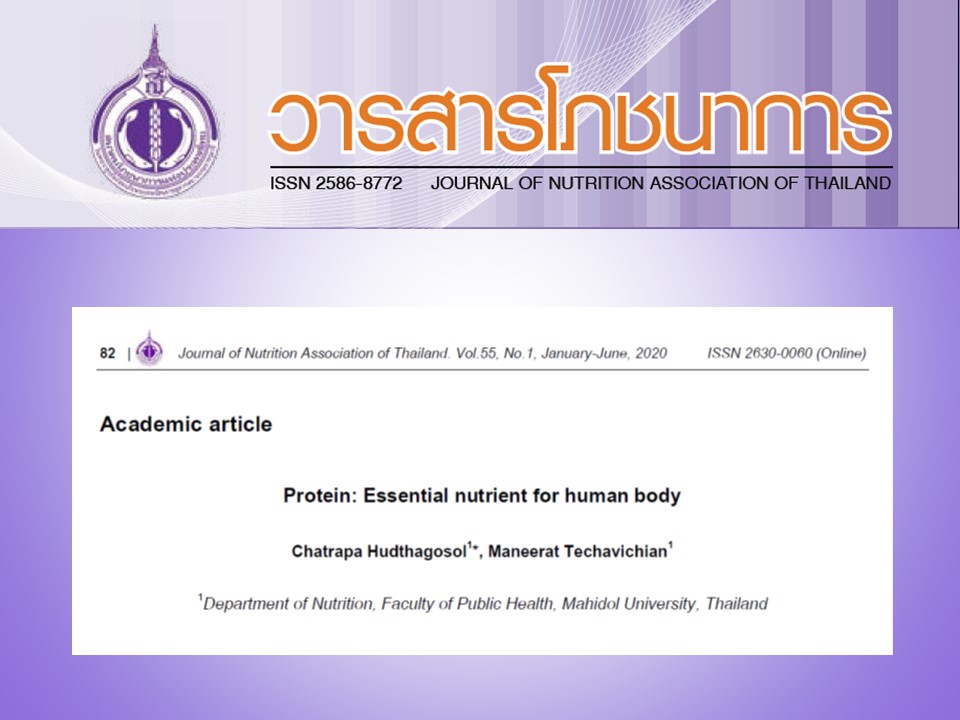Protein: Essential Nutrient for Human Body
Keywords:
Protein, Amino acid, Protein quality, Health consequences of protein deficiency, Health consequences of excessive proteinAbstract
Protein is an essential nutrient for human bodily functions. Protein is presnt in both animal and plant food sources. Proteins from animal source foods provide complete protein since they are composed of all essential amino acids and in adequate quantity. On the contrary, plant proteins are incomplete protein as they contain fewer essential amino acids or in low quantity, hence these sources alone are inadequate in meeting the protein needs for human body. When human ingests dietary proteins from plant and animal foods, proteins are broken down to amino acids by gastric acid and digestive enzymes. These amino acids are used for building the body proteins for performing many functions in our body. However building proteins to meet the body needs require all 20 amino acids, therefore it is important to consume varities of protein foods from both plant and animal source foods. For vegetarians, it is recommended to consume 2-3 types of plant source foods to complement the protein quality. Adequacy of protein intake can be determined by the knowledge on nitrogen balance which can assist health-care providers to plan proper diets for patient management. For maintaining good health, individuals should not consume too little or too much dietary proteins. The health consequences of protein deficiency and excessive protein result in dysfunctional organs that cause multiple clinical symptoms.
References
Insel P, Turner ER, Ross D. Nutrition. 3rd ed. Sunbury: Jones and Bartlett; 2007.
Kumar V, Shukla AK, Sharma P, Choudhury B, Singh P, Kumar S. Role of macronutrient in health. World J Pharm Res. 2017; 6(3):373-81.
Academy of Nutrition and Dietetics. Teaching Dietary Protein Basics [Access on 2018 Dec 29]; Available from: https://www.eatrightpro.org/practice/practice-resources/international-nutrition-pilot-project/teaching-dietary-protein-basics
Michelle M, Kathy AB. Nutritional Sciences: From Fundamentals to Food. 2nd ed. Belmont: Wadsworth Cengage Learning; 2011.
นัยนา บุญทวียุวัฒน์. ชีวเคมีทางโภชนาการ. กรุงเทพมหานคร: เจริญดีมั่นคงการพิมพ์; 2553.
Nehete J, Bhambar R, Narkhede M, Gawali S. Natural proteins: Sources, isolation, characterization and applications. Pharmacogn Rev. 2013; 7(14):107-16.
Chayanon Peerapittayamongkol. Protein and amino acid metabolism. 2014 [updated 2019 Feb 24]; Available from: https://www.si.mahidol.ac.th/department/Biochemistry/home/MD/นศพ.57/อ.ชยานนท์%209%20ก.ย.57%20เมตะบอลิสมกรดอะมิโนและโปรตีน%202014.pdf
Delimaris I. Adverse effects associated with protein intake above the recommended dietary allowance for adults. ISRN Nutr. 2013; 1-6.
Jäger R, Kerksick CM, Campbell BI, Cribb PJ, Wells SD, Skwiat TM, et al. International society of sports nutrition position stand: protein and exercise. Sports Nutr Rev J. 2017; 14(1):1-25.
Guoyao Wu. Dietary protein intake and human health. Food Funct. 2016; 7(3):1251-65.
วิชัย เอกพลากร. รายงานการสำรวจสุขภาพประชาชนไทย โดยการตรวจร่างกาย ครั้งที่ 4 พ.ศ. 2551-2. นนทบุรี: เดอะกราฟิโก ซิสเต็มส์; 2553.

Downloads
Published
How to Cite
Issue
Section
License
Upon acceptance of an article, copyright is belonging to the Nutrition Association of Thailand.


